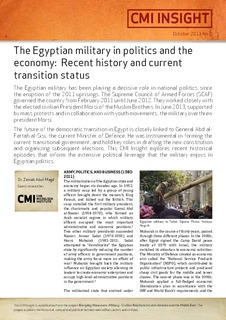| dc.contributor.author | Abul-Magd, Zeinab | |
| dc.date.accessioned | 2018-01-04T08:19:56Z | |
| dc.date.available | 2018-01-04T08:19:56Z | |
| dc.date.issued | 2013-10-24 | |
| dc.identifier | oai:www.cmi.no:4935 | |
| dc.identifier.citation | Bergen: Chr. Michelsen Institute (CMI Insight vol. 2013 no. 2) 6 p. | |
| dc.identifier.uri | http://hdl.handle.net/11250/2475052 | |
| dc.description.abstract | The Egyptian military has been playing a decisive role in national politics since the eruption of the 2011 uprisings. The Supreme Council of Armed Forces (SCAF) governed the country from February 2011 until June 2012. They worked closely with the elected civilian President Morsi of the Muslim Brothers. In June 2013, supported by mass protests and in collaboration with youth movements, the military overthrew president Morsi.
The future of the democratic transition in Egypt is closely linked to General Abd al-Fattah al-Sisi, the current Minister of Defence. He was instrumental in forming the current transitional government, and hold key roles in drafting the new constitution and organizing subsequent elections. This CMI Insight explores recent historical episodes that inform the extensive political leverage that the military enjoys in Egyptian politics. | |
| dc.language.iso | eng | |
| dc.publisher | Chr. Michelsen Institute | |
| dc.relation | CMI Insight | |
| dc.relation | 2013:2 | |
| dc.relation.ispartof | CMI Insight | |
| dc.relation.ispartofseries | CMI Insight 2013:2 | |
| dc.relation.uri | https://www.cmi.no/publications/4935-the-egyptian-military-in-politics-and-the-economy | |
| dc.subject | Military | |
| dc.subject | Democracy | |
| dc.subject | Egypt | |
| dc.title | The Egyptian military in politics and the economy: Recent history and current transition status | |
| dc.type | Report | |
